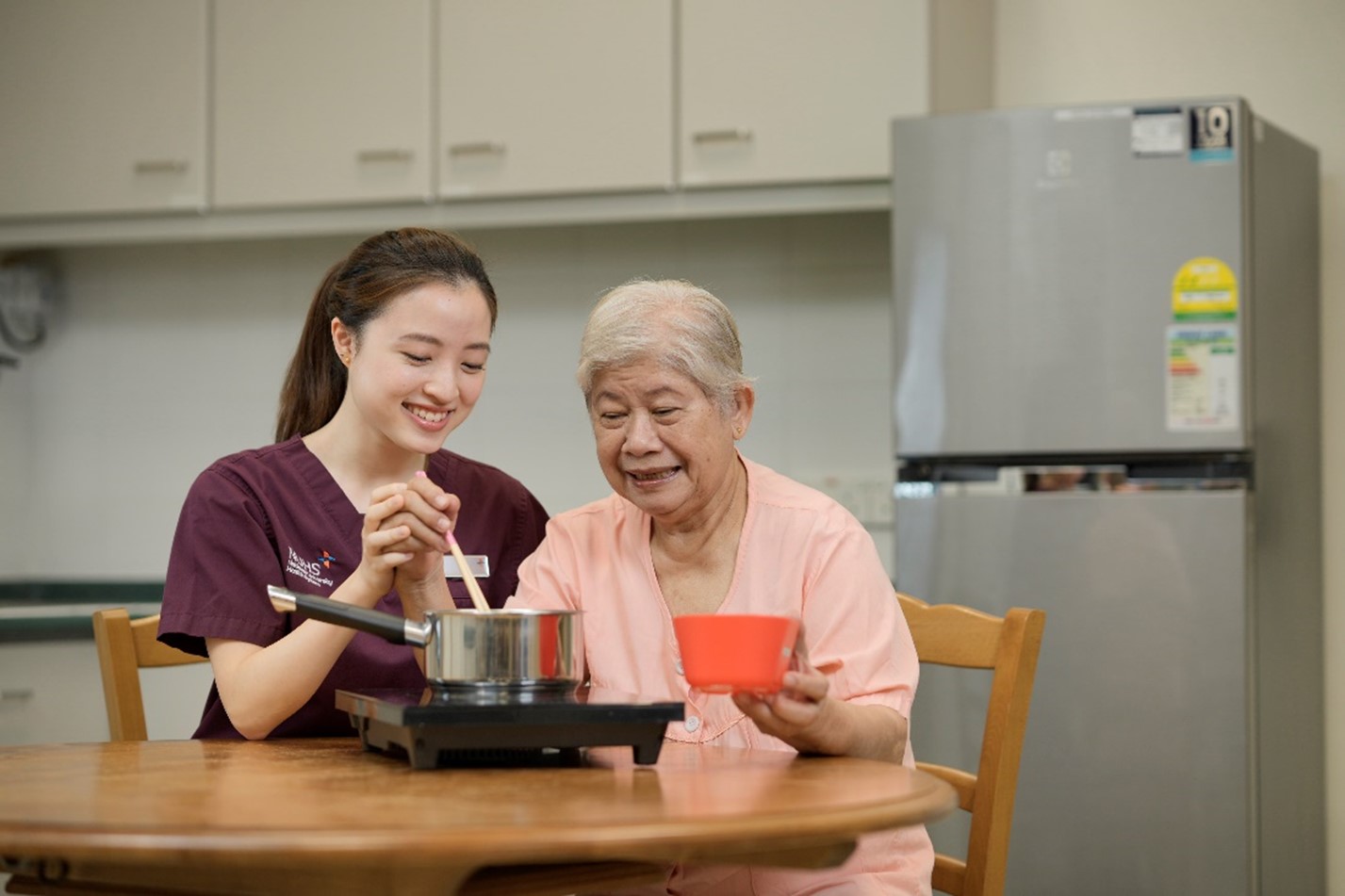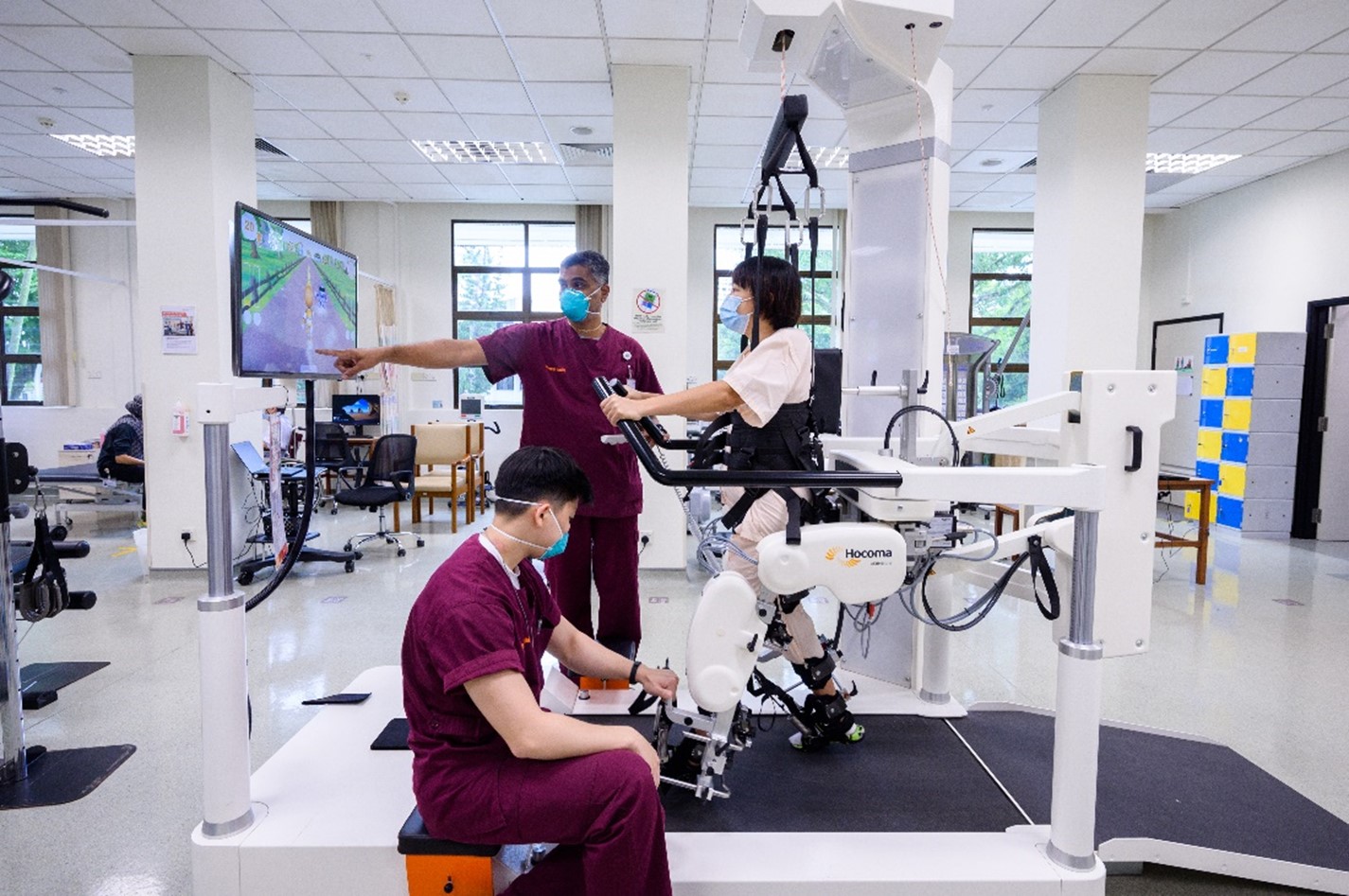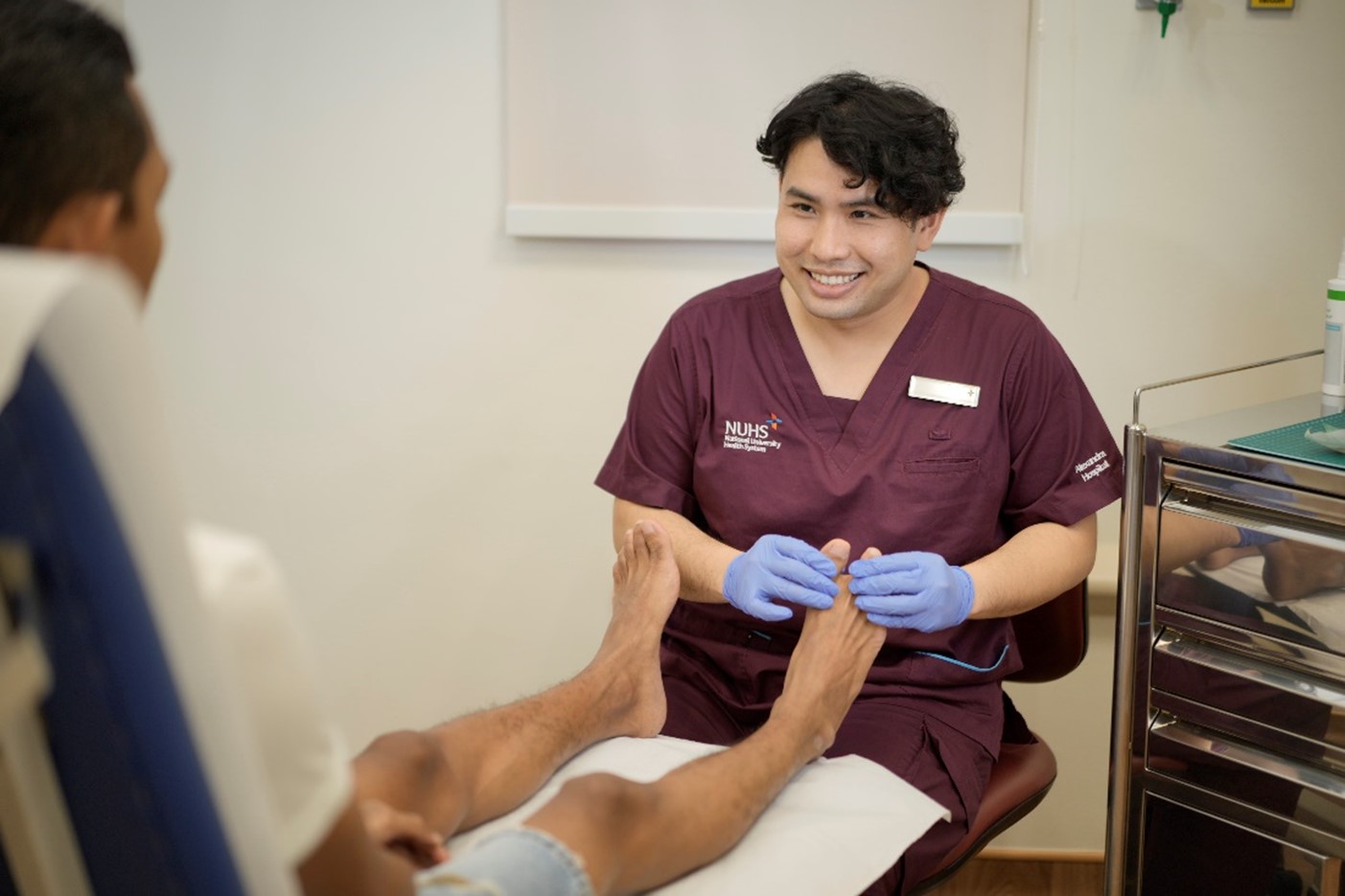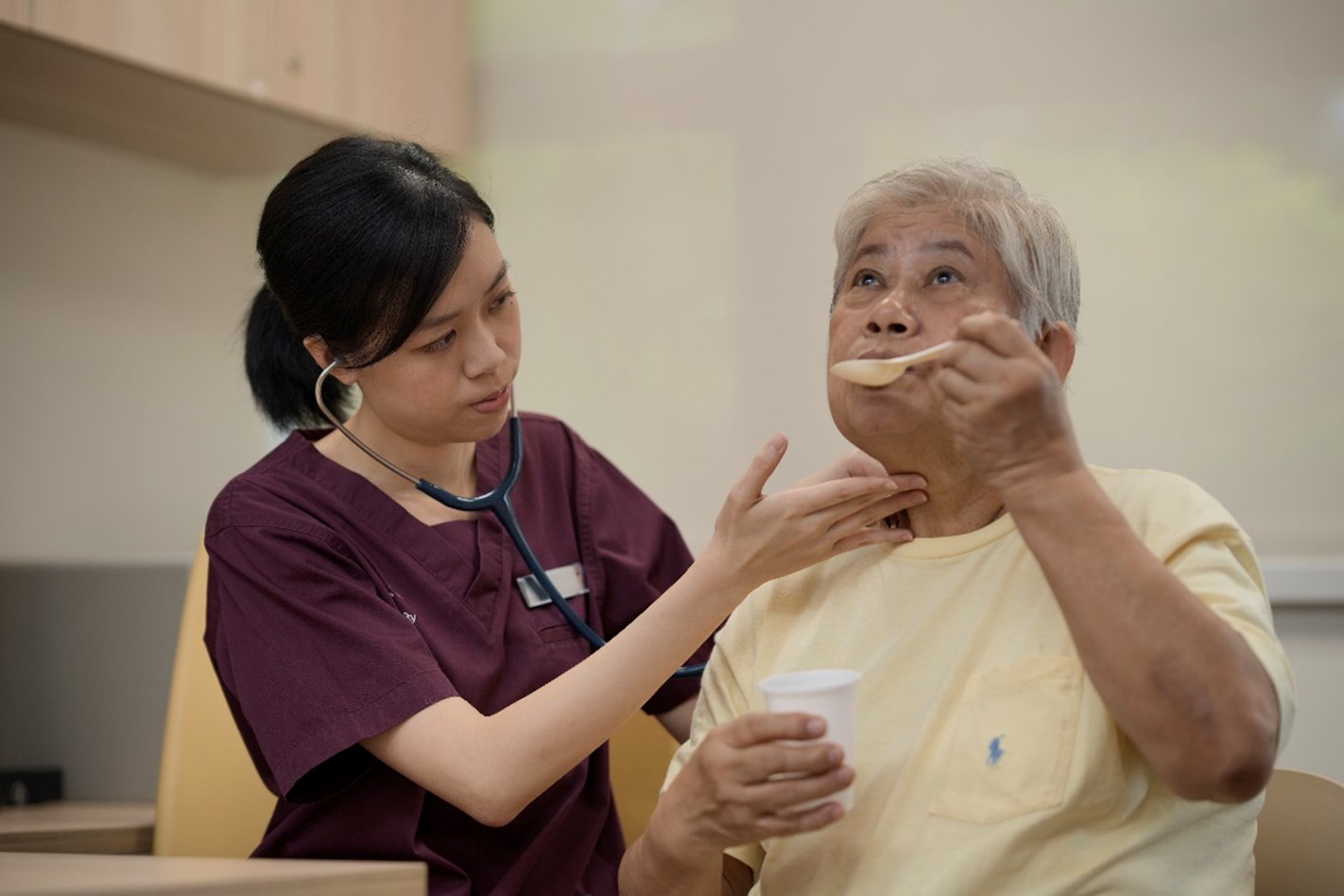NUHS Institutions will NEVER ask you to transfer money or disclose bank details over a call.
If in doubt, call the 24/7 ScamShield helpline at 1799, or visit the ScamShield website at www.scamshield.gov.sg.
The Rehabilitation department provides the following services:
We strive to provide tailored interventions to help our patients achieve their best possible functional outcomes.

Occupational Therapy is a health profession that focuses on the empowerment and facilitation of individuals throughout all stages of life to perform tasks, and roles which are meaningful to them.
Occupational Therapists use activities with identified goals to help individuals prevent, reduce, or overcome effects of disabilities. These activities include and are not limited to self-care, work, and leisure. The areas of practice include:

Physiotherapy applies a broad range of physical therapies and techniques including movement, exercise, and modality to help those affected by injuries, illnesses, or other impairments. As Physiotherapists, we assess, plan, and implement rehabilitative programs that improve or restore human motor functions, maximise movement ability, and relieve pain syndrome. We work closely with other healthcare professionals to ensure that patients are well cared for and are equipped with the knowledge to continue self-management.

Podiatry is an Allied Health Profession that is dedicated towards managing and preventing medical and surgical conditions of feet and lower limbs. Podiatrists are trained to address a wide spectrum of issues including wound care, pathological nails, joint pain, sports-related injuries, and general skin conditions such as calluses, corns, and warts. Painful ingrown toenail problems can be alleviated conservatively or through surgical intervention under the use of a local anesthetic.
Podiatrists play a crucial role in preserving overall foot health, ensuring mobility, and alleviating patient discomfort.

Speech therapy is a specialised field that involves the assessment and management of swallowing and communication disorders. Communication disorders entail impairments in the domains of language, speech, voice, and / or cognitive-communication.
Swallowing disorders are managed by modifying diet and fluid consistencies, conducting radiologic or endoscopic evaluations, prescribing rehabilitation exercises, and/or caregiver training.
Communication disorders necessitate individualised and targeted interventions that enable a person to attain their goals and engage in meaningful social interactions.
"If you take out the team in teamwork, it's just work. Now who wants that?" - Matthew Stover
My amazing teammates have made the past few years in Alex so much more than just a place to do work. We have pushed each other to grow as clinicians and humans, supported one another through every success and trial, and learned to love each other's patients like our own. I look forward to working with these people every single day.
I'd say there's never a dull day in Alex. I'm constantly encouraged to take on new challenges and pick up new skills, and it's inspiring to be surrounded by colleagues who are so passionate and people-centered in their care. We have some exciting times ahead of us, and I look forward to seeing how much more this family will grow!
My work brings me from inpatient to outpatient rehab within the same day, with regular training opportunities to build up my skills in other areas such as hand therapy.
As part of the Specialized Rehabilitation team, I get to work with patients with a range of neurological conditions, such as stroke, brain injury and spinal cord injury. I start off by finding out what is most important to them, and how their conditions have affected their ability to carry out these activities. We then work towards getting them back to doing these activities, often having to brainstorm and develop new ways of doing them.
I train patients in a variety of settings, from the ward to the gym, to the kitchen. Occasionally, I may even take patients out to the garden to enjoy a bit of nature during their therapy sessions, which they love! Apart from helping patients in their recovery, my work also includes equipping them with support that they need. These can come in the form of assistive devices, getting their home environments modified, and training their caregivers to facilitate their daily functions.
As Occupational Therapists, we focus on enhancing patients' ability to participate in activities and roles which they value. In a hospital setting, our intervention is often focused on patients' ability to perform basic self-care. Seemingly small wins can be the most impactful points in a patient's journey - like successfully drinking from a cup using their stroke-affected hand for the first time after weeks of upper limb rehabilitation. Another example would be to hold a brush and comb their hair using their affected hand once again.
Beyond pushing patients to achieve tangible goals that matter to them, Occupational Therapy also helps to improve patients' self-confidence and emotional wellbeing. Being able to participate in valued roles (such as that of a self-carer, a parent, an employee etc.) gives them a sense of empowerment and meaning in life. While working with patients towards their goals, we also weave psychoemotional support into our interventions, not just for the patients but their families and caregivers as well.
We are not a team because we work together. We are a team because we respect, trust and care for each other. - Vala Afshar
On a usual day, I would see patients that require physiotherapy services. My patients usually experience pain, have difficulty moving, or even struggle to clear their phlegm. I would assess their needs based on the cause of their pain, their fall risk, and if they require maintenance of strength. Through the assessment, I would then be able to prescribe the best suited exercises that ensure the patients will be able to conduct the exercises safely on their own. In Alex, we work as a team with other healthcare professionals, discussing and providing a holistic approach in caring for each patient.
Apart from seeing patients admitted to the hospital, I also see patients in the community. I teach these community patients some exercises that they can easily manage at home. Our team conducts exercise classes for seniors to maintain their physical fitness as well.
What we do matters in people's lives. We were able to prevent a stroke patient in his early 30s from staying in a nursing home for the rest of his life. He was unable to walk after suffering from the stroke, and his elderly parents were unable to take care of him. Our physiotherapy team held a discussion as we felt that if he were to be sent to a nursing home, the chances of him being able to walk again would be very low. Albeit challenging, we decided to take on this challenge to help him recover. As there were uncertainties, we advocated for a longer duration of therapy for him and worked hard as a team for his rehabilitation. At the end, we were delighted to be able to help him walk on his own.
At Alex, I am fortunate to work with an exceptional team of healthcare professionals who inspire and empower me.
Our work culture is characterised by a willingness to learn, compassion, and a shared desire to improve the lives of patients. Together, we strive for excellence in patient care and are united in our mission to serve our patients.
Feet are the foundation of mobility, and managing podiatric conditions, providing preventive care, and guidance enhances the quality of life. The role of a podiatrist is important with far-reaching impacts on both the healthcare system and patients' lives. By addressing foot and ankle health, podiatrists contribute significantly to patients' overall well-being.
Foot and ankle problems can impair mobility, independence, and health. Effective podiatric care not only relieves pain and discomfort but also prevents complications that can lead to more serious health problems. This is important to reduce the burden on the healthcare system and promote healthy aging by enabling patients to maintain an active lifestyle and participate in their community.
As a podiatrist, I focus on managing foot and lower limb conditions that will help to enhance patients' mobility, overall well-being, and preventative care. My job scope encompasses comprehensive footcare assessments, tailor fit individual management plans for various podiatric conditions, and offering patient education. It is a privilege that I get to utilize my skills under various settings in the inpatient wards, outpatient clinics, and nursing home. Staying updated on the latest advancements in podiatry through ongoing education and research allows me to provide effective, evidence-based care.
Heel pain and other musculoskeletal conditions are commonly seen in Alex. A Podiatrist will generally perform a biomechanical assessment and gait analysis to help identify the contributing factors for the condition. Evaluation of footwear is integral to our clinical practice as Podiatrist can then educate patients on healthier footwear choices which will benefit their foot health. At times, customised insoles can be prescribed along with good footwear to achieve optimal outcome.
The key highlight of my job is to witness the positive impact of podiatric interventions on patients' lives, allowing them to regain independence and lead healthier, pain-free lives. Encompassed with a sense of achievement, I am honoured to be able to contribute to patients' overall well-being and play a pivotal role in their journey towards optimal foot health.
We walk with you and your loved ones through your health journey as we redesign healthcare with our people and our community.
It is my hope that we do not forget that our purpose is to serve our patients yet at the same time protect ourselves as a healthcare team (both physically and mentally) to continue providing the best care to those we look after.
The first thing I do when I get to work is to check my ward list and plan out the patients whom I need to see, as well as catching up on latest updates on my patients. Thereafter, I proceed to the wards to assess the communication and swallowing function of my patients. I would then provide recommendations to help them communicate more effectively, as well as to eat and drink safely and comfortably. After my rounds, I would discuss with the nurses, Doctors, and other Allied Health Professionals on my assessments, recommendations, and plans for the patients to ensure a safe discharge.
One of my favourite parts of my day is to develop holistic and patient-centered plans. This is only possible after we update the patients' families and carers, ensuring that they understand the care plans and address any concerns they may have.
The Speech Therapy team will catch up with each other during the day to ensure that everyone is coping well with the workload and discuss cases (some of them can be complex and it is nice to get feedback from other clinicians). We also share with each other on the happenings in the research world to keep our skills evidence-based and up to date.
Communication and swallowing are essential aspects of our humanity. It allows us to express ourselves and connect with others. When this ability is impaired by an illness, one may face challenges in expressing themselves and maintaining social interactions with friends and family. This will cause the person to feel isolated, frustrated, and deprived of their personhood.
We need food and drinks not only to nourish our bodies, but also our souls as we gather during mealtimes to spend time with our loved ones. When a person's swallowing function changes due to illness, there may be subsequent impacts on nutrition, chest health, and the person's well-being.
As speech therapists, we are here to support people with communication and swallowing difficulties. We work with them to develop a plan that enhances their quality of life, respects their identity, and helps them achieve their goals. We are committed to accompanying them on their journey of recovery.